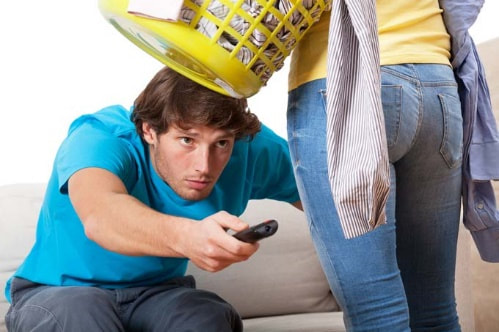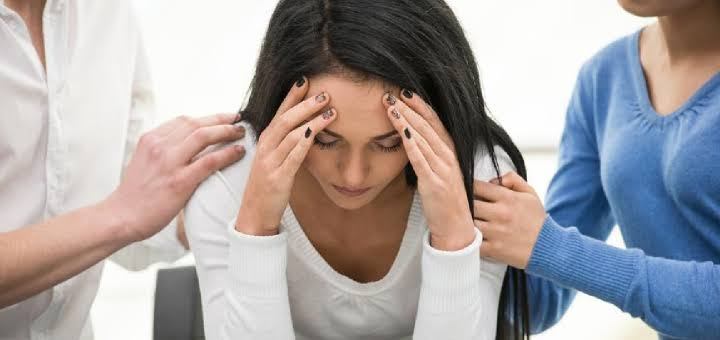 Nowhere Has it Been Etched that Household Work is a Woman’s Job! Men, Don’t Be Scared to Take Responsibility Nowhere Has it Been Etched that Household Work is a Woman’s Job! Men, Don’t Be Scared to Take Responsibility There hasn’t been a change in the well-established fact that women have a longer lifespan than men but there has been a monumental change in the way these women lead their lives compared to men. Isn’t it natural for men to blame their wives to be always demanding, frustrated, anxious and even angry while they boast of being cool, composed and ready to handle any situation with composure? That’s true but its only one side of the story. How about switching over the roles for a day and maybe both men and women would come to understand the stress and pain faced by each other everyday. While we debate, speak about gender inequality and brood over the unjust life of women who are forced to juggle between office and household chores multitasking ample things simultaneously there is rock-solid evidence from scientists that women’s health has significantly decreased since the 1990s while that of men has improved since 1990 due to gender disparity in the society that’s causing harm to a young woman’s well-being (https://indianexpress.com/article/lifestyle/health/study-shows-womens-health-worsened-since-1990-4955984/). Two decades back, almost 8.5% women reported a downslide in health compared to their peers and the rates increased to almost 20% In 2014. On the other hand, men reported an improvement in their health. Expectation Chock-a-block The health discrepancy doesn’t stop with general health problems but is deep-rooted in obesity, anxiety and dissatisfaction issues. The National Women’s Health Survey (Australia), 2019 doesn’t cheer us up in any way with its results and in fact, is a cause for deep worry! Almost a third (36%) of women complained of anxiety and depression; 42% women reported feeling nervous, anxious or on the edge of an emotional breakdown every day or at least once a week in the past 4 weeks; women aged between 18 and 35 reported maximum anxiety levels and loneliness and more than 50% of women (aged 36-65) consider themselves to be overweight/obese. Such staggering health hazards in women are a clear indication that our young ladies are trying their best for an unequivocal work-life balance but at the end of day, unable to achieve it. They are chocked from all sides with work pressure, relationship tangles and naughty kids which reaches the ultimatum with peer pressures and societal posts on their physical appearance and lifestyles. Most of the women worry over any or all of these issues almost on all days of the week and it’s those women under 36 who are maximum affected by its effects. These younger ladies find trouble falling asleep, staying asleep, staying seated for a while and can be easily annoyed. Most women also feel lonely despite having a distinct social media presence and being online constantly. If family commitments and worries take out every inch of energy left out in women workplace demands are even more annoying. Gender disparity remains an unsorted issue even in 2019 with men being paid extremely high packages compared to these poor souls who given their heart and soul into work commitments. 35-40 hours of work is the standard protocol but this can only be a reality in our dreams! Most of us work for a minimum of 40 hours and it can go up to 55 hours for some and these women face graver risks of developing depressive symptoms compared to others. Men, on the other hand, don’t face the slightest symptoms of depression even after working for the longest number of hours. A study also showed that married women with kids were less likelier to work for longer hours but marriage did not affect the work timings of men in any way which is a clear indication that women are still burdened with primary responsibility of household work even now and I guess, each of us (myself included) agree to this without the slightest hesitation! Despite this, the domestic duties, care given to family members and housework is not given the slightest consideration which makes her situation pathetic. Taking into account all of these it is seen that women in fact work harder and longer than men owing to unequal work distribution which can be linked to their poorer physical health. Four of every 100 people experience anxiety around the world and one of every four women suffer from anxiety. This clearly shows that anxiety not only affects those with chronic disease such as cancer, diabetes and heart disease but it can have a lasting impact on healthy, young people as well. Depression has been a pivotal topic of interest in recent times but we need to focus on anxiety as well as it can lead to suicide and have debilitating effects on the individual. Young Versus Old Ageing can be gruelling filled with loneliness and health issues but despite these older people are in fact happier than younger adults, according to a study published in the Journal of Clinical Psychiatry (https://time.com/4464811/aging-happiness-stress-anxiety-depression/). We believe that young age makes us happy with the happiness going for a dip around middle age and sinking deep into the ocean (like a ship) during older years but this study disproves all these. Though older people face disability issues, cognitive decline and economic crunches they have better mental health whereas, people in their 20s and 30s suffer from problems related to depression, anxiety, stress, satisfaction, happiness and well-being. After readjusting to changes during adolescence younger adults enter their next phase of life ready to face challenges in their financial, educational, romantic and career goals. They are always in a race ready to jump ahead of others and win but social media has made people competitive which is good but they have become comparative which makes them unhappy over some issue always. Changes in the society, technology development, globalization, competition for higher education, changes in roles played by women and economic crunches affect young women more than the elderly population. We proudly state that we are modern people who live a forward-minded life in the 21st century but when you think deeply not much has changed in the base-many women still face domestic violence, are treated not as equals despite earning higher than their spouses sometimes, take up most of the household chores, bear responsibility for kids, are looked down when they spend some time for their well-being and are still treated as unpaid servants when it comes to household chores. Then how can we not expect our young women to not face anxiety and depression issues? The key to the problem lies with both the genders-while men should start treating women with a fair view and start taking up every chore possible women too should think of themselves as equals, should start delegating work to all family members, shun away comments from the society or family elders and consider themselves worthy. This could help resolve anxiety-related problems and help younger women become happier citizens. References Its’s Not Easy Being a Young Woman these Days: Levels of Anxiety Higher Among Young Women than Seniors: https://www.smh.com.au/national/it-s-not-easy-being-a-young-woman-these-days-levels-of-anxiety-higher-among-young-women-than-seniors-20191022-p53387.html Women who Work After Office Hours are More Prone to Depression: https://timesofindia.indiatimes.com/life-style/relationships/work/women-who-work-after-office-hours-are-more-prone-to-depressive-symptoms/photostory/68579061.cms?picid=68579062 Why Women are Way More Likely than Men to Suffer Anxiety: https://edition.cnn.com/2016/06/08/health/women-anxiety-disorders/index.html Mental Health: One in Four young Women Struggling: https://www.bbc.com/news/health-46295719 Faces of Chinese Youth: Why are They Anxious? http://www.chinadaily.com.cn/a/201811/15/WS5becd3c2a310eff303288d6e.html Study Shows Women’s Health Worsened Since 1990: https://indianexpress.com/article/lifestyle/health/study-shows-womens-health-worsened-since-1990-4955984/ Comments are closed.
|
AVOID FRAUD. EAT SMART.+91 7846 800 800
AuthorDietitian & Nutritionist Dr. Nafeesa Imteyaz. Archives
July 2024
Categories
All
Dr. Nafeesa's Blog @blogspot |
- Home
- Written Testimonials
- Consult
- Clinics
- Blogs
-
Diet & Nutrition
- Diabetes Reversal
- IVF IUI not needed for PCOS PCOD Infertility
-
Medical Nutrition
>
-
Disease & Conditions
>
- Infertility | PCOS
- Diabetes Mellitus
- Cholesterol
- Hypothyroid
- Kidney Problems
- Hypertension
- Cardiovascular Diseases
- Liver Diseases
- Gastro intestinal disorder
- Cancer
- Metabolic Disorders
- Orthopedic Disorders
- Eating Disorders
- Dietary Recall
- Weight Record Filled By Clients
- Online Payment Transaction Details
- Online Clients Weight Check Form
- Our Program Package Service Charges
- Weight Record 2017 Clients
- Measurements sent by Clients
- Terms & Conditions Of Payment
- Thanks. Your Form is Submitted
- Video Testimonials
- Lifestyle & Wellness
- Lifestyle & Wellness Blog
- Allergy & Intolerance
- Weight Loss / Gain
- Weight Loss / Slimming Blog
-
Disease & Conditions
>
- Life Cycle Nutrition >
- Sports Nutrition >
- Integrity in Nutrition
- Knowledge Centre
© COPYRIGHT 2022. ALL RIGHTS RESERVED. FRST HEALTHCARE PVT LTD.
Dr. Nafeesa Imteyaz of First Eat Right clinic, is the Best Dietitian Nutritionist in Bangalore. Best Dietitian Nutritionist in Pune. Best Dietitian Nutritionist in Hyderabad. Best Dietitian Nutritionist in Chennai. Best Dietitian Nutritionist in Mumbai. Best Dietitian Nutritionist in Delhi. Best Dietitian Nutritionist in Kolkata.


